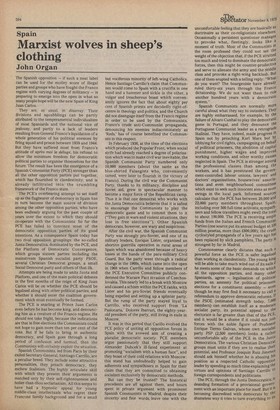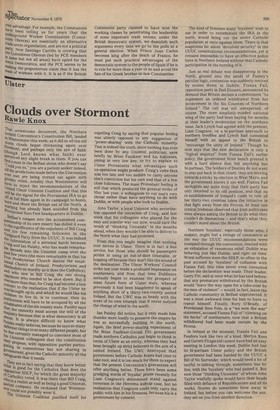Spain
Marxist wolves in sheep's clothing
John Organ
The Spanish opposition — if such a neat label can be used for the motley score of illegal parties and groups who have fought the Franco regime with varying degrees of militancy — is preparing to emerge into the open in what so many people hope will be the new Spain of King Juan Carlos.
They are, as usual, in disarray. Their divisions and squabblings can be partly attributed to the temperamental individualism of most Spaniards and the national vice of jealousy, and partly to a lack of leaders resulting from General Franco's liquidation of a whole generation of his political enemies by firing squad and prison between 1939 and 1944. But they have suffered most from Franco's attitude of apr's moi le deluge, his refusal to allow the minimum freedom for democratic political parties to organise themselves for the future. The result has been the emergence of a Spanish Communist Party (PCE) stronger than all the other opposition parties put together, which has flourished in clandestinity, and is already infiltrated into the crumbling framework of the Franco state.
The PCE's overbearing attempt to set itself up as the flagbearer of democracy in Spain has in turn become the main source of division among the other opposition parties, who have been endlessly arguing for the past couple of years over the extent to which they should co-operate with the Communists. So far the PCE has failed to convince most of the democratic opposition parties of its good intentions. As a consequence Spain today has two rival opposition groupings: the so-called Junta Democratica, dominated by the PCE, and the Platform of Democratic Convergence, which groups sixteen parties including the mainstream Spanish socialist party PSOE, several Christian Democrat groups, a small Social Democrat party and others of that ilk.
Attempts are being made to units Junta and Platform, and one of the main political debates in the first months of the reign of King Juan Carlos will be on whether the PCE should be legalised along with other political parties, and whether it should enter the coalition government which must eventually be formed.
The PCE is snarling at Prince Juan Carlos even before he has become king, and denouncing him as a creature of the Franco regime. He should not take fright, because the indications are that in free elections the Communists could not hope to gain more than ten per cent of the vote. But if he fails to bring in authentic democracy, and Spain goes through a long period of confusion and turmoil, then the Communists will certainly exploit the situation. Spanish Communists, led from Paris by their exiled Secretary-General, Santiago Carrillo, are a peculiar breed. They include some attractive personalities, they preach democracy, they eschew Stalinism. The highly articulate skill with which they present their arguments is matched only by their self-righteousness and holier-than-thou sectarianism. All this seems to have had a hypnotic appeal for young middle-class intellectuals who regret their Francoist family background and for a small but vociferous minority of left-wing Catholics. Hence Santiago Carrillo's claim that Communism would come to Spain with a crucifix in one hand and a hammer and sickle in the other, a vulgar and treacherous boast which conveniently ignores the fact that about eighty per cent of Spanish priests are decidedly right-ofcentre in theology and politics, and the Church did not disengage itself from the Franco regime in order to be used by the Communists. Franco's crude anti-Communist propaganda, denouncing his enemies indiscriminately as 'Reds,' has of course benefited the Communists in this respect.
In February 1936, at the time of the elections which produced the Popular Front, when social strife had already reached a degree of polarisation which was to make civil war inevitable, the Spanish Communist Party numbered only 10,000 members (about the sanie as the blue-shirted Falangists who, conveniently tamed, were later to flourish in the victory of Franco). During the civil war the Communist Party, thanks to its militancy, discipline and Soviet aid, grew in spectacular manner to become a major force of the Republican camp. Thus it is that one democrat who works with the Junta Democratica believes that it is safest to encourage the Communists to play the democratic game and to commit them to it ("They gain in wars and violent situations, they lose in free elections"). Other Spanish democrats, however, are wary and suspicious.
After the civil war, the Spanish Communist Party was strongly pro-Soviet, and one of its military leaders, Enrique Lister, organised an abortive guerrilla operation in rural areas of Spain which was abandoned because of heavy losses at the hands of the para-military Civil Guard. But the party went through a radical change in the 1960s, which came into the open in 1968 when Carrillo and fellow members of the PCE Executive Committee publicly condemned the Warsaw Pact invasion of Czechoslovakia. This nearly led to a break with Moscow and caused a schism within the PCE ranks, with Lister and his pro-Soviet friends eventually being expelled and setting up a splinter party. But the rump of the party stayed loyal to Carrillo, who received support from 'La Pasionaria,' Dolores Ibarruri, the eighty-yearold president of the party, still living in exile in Moscow.
It was in this period that Carillo evolved the PCE policy of uniting all opposition forces in Spain with the avowed aim of creating a pluralist democratic society. PCE members argue passionately that they still support Alexander Dubcek's ill-fated experiment at promoting "socialism with a human face", and they boast of their cold relations with Moscow: this stand has undoubtedly helped to gain adherents and sympathisers in Spain for their claim that they are committed to obtaining socialism exclusively by democratic methods.
But can they be trusted? The historical precedents are all against them, and hours spent in private argument with prominent Spanish Communists in Madrid, despite their sincerity and fine words, leave one with the
uncomfortable feeling that they are basically as doctrinaire as their co-religionists elsewhere. Occasionally a persistent questioner manages to provoke what, fleetingly, looks like oa moment of truth. Most of the Communists in the room professed they could not see the weight of the objection that, if the PCE strutted too much and tried to dominate the democratic forces, then this might be counter-productive and serve to alienate the army and the middle class and provoke a right-wing backlash. But one of them erupted with a telling reply: "What do you want? The bourgeoisie have alreadY ruled thirty-six years through the Franco dictatorship. We do not want then.' to rule another hundred years with a democratic system." Spanish Communists are normally more careful about what they say to outsiders. They are highly embarrassed, for example, by the failure of Alvaro Cunhal to play the democratic game in Portugal, and they denounce the Portuguese Communist leader as a retrograde Stalinist. They have, indeed, made progress in Spain not by preaching Karl Marx but bY lobbying for civil rights, campaigning on behalf of pollitical prisoners, the abolition of capital punishment, higher wages and improved working conditions, and other worthy causes neglected in Spain. The PCE is stronger among the professional classes than among the workers, and it has penetrated the government-controlled labour unions, lawyers' and doctors' organisations, housewives' associations and even neighbourhood committees which exist to seek such innocent aims as more swings in the local park. Informed sources calculate that the PCE has between 20,000 and 22,000 party members throughout Spain, including over 500 full-time activists; sympath; isers and fellow travellers might swell the total to about 100,000. The PCE is receiving ample funds from the Italian and French Communist Parties (one source put its annual budget at 10° million pesetas, more than £800,000); the crude cyclostyled propaganda of a few years ago has been replaced by slick pamphlets. The party 15 strongest by far in Madrid.
Commonsense clearly dictates that such a powerful force as the PCE is safer legalised than working in clandestinity. The young king will be able to take much wind out of its sails if he meets some of the basic demands on which all the opposition parties, and many other Spaniards, agree — legalisation of political parties, an amnesty for political prisoners' elections for a constituent assembly — even though he may first find it necessary to call a referendum to approve democratic reforms. If the PSOE (estimated strength today, 7,00a members) can establish itself as a moderate socialist party, its potential appeal to the electorate is far greater than that of the PCF, and it would be a shame if it could not join forces with the noble figure of Professor Enrique Tierno Galvan, whose own socialist party PSP (2,500 members) looks a rather uncomfortable ally of the PCE in the Junta Democratica. The various Christian Democrat groups must units if they are to realise their potential, and Professor Joaquin Ruiz Jimenez should ask himself whether he is abusing Ills position as a respected Catholic opposition leader by spending so much time explaining the virtues and opinions of Santiago Carrillo ta foreign correspondents and politicians. The PCE, through the Junta Democratica, is deanding formation of a provisional govern' ment with an important place for itself. But it is becoming discredited with democrats by the shameless way it tries to turn everything to its own advantage. For example, the Communists have been telling us for years that the underground Worker Commissions (Comisjuries Obreras) are essentially an alternative trade union organisation, and are not a political Party. Now Santiago Carrillo is crowing that the Comisiones Obreras (led by PCE members in some but not all areas) have opted for the Junta Democratica, and the PCE seems to be making the preposterous claim that it has the Inns of workers with it. It is as if the British
Communist party claimed to have won the working classes by penetrating the leadership of some important trade unions; under the British democratic system, we demolish such arguments every time we go to the polls at a general election. When Prince Juan Carlos becomes king after the death of Franco, he must put such practical advantages of the democratic system to the people of Spain if he is to rule for more than a year or so and avoid the fate of his Greek brother-in-law Constantine.

































 Previous page
Previous page